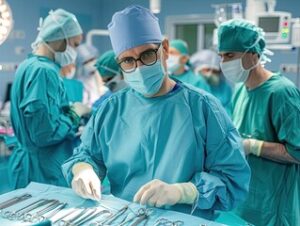Surgeons are medical doctors who have additional, specialized training that allows them to perform invasive surgical procedures. Physicians and surgeons both play important roles in healthcare, but their specialties, job duties and daily responsibilities are different.

Surgeon Phoenix works in hospitals and private practices. They are responsible for assessing patients before surgery, performing the operation and overseeing post-op care.
Surgeons have a unique career path that requires rigorous and specialized training. They work with patients to develop treatment plans, perform surgeries, and collaborate with other healthcare professionals to provide comprehensive patient care.
Surgeons typically work in hospitals and clinics, but may also operate out of private practices or surgical centers. They must be able to work under high pressure and make quick decisions during surgery. They must also be able to communicate effectively with patients and their families before, during, and after surgery to educate them about the procedure, explain risks and benefits, and provide emotional support.
Those interested in becoming surgeons must first complete a medical degree at an accredited university. They must then pass the USMLE Step 1 & 2 exams or COMLEX-USA Level 1 to become licensed doctors of medicine. From there, they can choose to pursue a surgical residency in their desired specialty. During the residency, they will learn about surgical techniques and procedures through hands-on experience with the guidance of senior physicians. After completing their residency, they can opt to become board certified in their chosen specialty or subspecialty.
Surgeons must also maintain their professional skills by participating in continuing education, attending conferences, and conducting research to stay up-to-date with the latest medical advancements and surgical techniques. They may also choose to join medical or surgical societies, which can help them network with peers and stay abreast of the latest developments in their field.
The ability to self-critique and take constructive criticism are important for surgeons to develop, as is a strong desire to achieve perfection. Developing this drive is especially important for beginners, as it can motivate them to seek out senior mentors and learn from their mistakes. In addition, it can help them avoid the trap of mediocrity and stagnation, which is common for beginners in any field. Having a strong sense of curiosity is another important characteristic that surgeons must possess, as it will enable them to remain adaptable and flexible in their practice. This can help them quickly respond to changes in patient populations, medical technology, and insurance reimbursement policies.
Work Environment
Surgeons work in high-stress, fast-paced environments and may be on call for emergencies on weekends and holidays. These factors can contribute to feelings of burnout and emotional distress, which can affect personal and professional performance. A surgeon’s ability to remain positive and focused in these challenging situations is essential to patient safety and the quality of care they provide.
Surgeons who enjoy their work environment may be more able to stay happy and positive in the face of difficult situations. They tend to enjoy the variety of their jobs, allowing them to develop expertise in a number of surgical procedures and specialties. They also like being able to work in teams and feel that their skills are utilized effectively in the workplace. In the past, former surgeons on CareerExplorer have rated their enjoyment of their work environment at an average of 4.1/5, showing that most surgeons do find satisfaction with their careers.
A successful surgical career requires a strong desire to improve the health and well-being of patients. It also requires the ability to connect with patients from a variety of backgrounds and traditions. Surgeons must be empathetic and compassionate and understand the unique physical, psychological and spiritual needs of each individual they encounter.
Disruptive behaviours among surgeons, such as a lack of respect for colleagues, can have negative effects on the surgeon’s personal and professional life. In addition, they can jeopardize patient safety and lead to poor medical outcomes.
In order to prevent these problems, many surgical organizations are implementing strategies to promote well-being and positive work environments. These efforts include focusing on wellness in the workplace, offering different support systems and helping surgeons to develop healthy lifestyle habits.
Surgeons can seek out specialties that offer a greater degree of work-life balance to help them maintain their happiness and wellbeing. They can also use alternative work schedules, such as locum tenens roles and part-time employment to allow them more time off for themselves and their families. With job satisfaction and a sense of meaning in work at an all-time low, these initiatives may be crucial to retaining talented and motivated surgeons.
Job Duties
Surgeons must have the ability to analyze situations accurately and take rapid action, as well as to communicate clearly with patients, other medical professionals and hospital staff. They must have good interpersonal skills, the ability to stay calm and in control during stressful situations, superb manual dexterity, eye hand coordination and visuospatial awareness. They also need to be able to understand the technical aspects of their work, such as laboratory analyses and x-rays.
A surgeon’s job duties may vary depending on the specialization of the field, but in general they are responsible for analyzing the patient’s medical history and medication allergies, as well as their current physical condition, to determine whether or not surgery is needed. They may need to explain complex medical terms to their patients, so it is important that they are able to convey the information in a way that is easy for non-medical people to understand.
They will usually operate on patients to treat injuries, diseases and deformities. This can involve invasive or minimally invasive surgical methods, including the use of instruments and appliances or manual manipulation. Surgeons must also follow medical or hospital protocols and regulations in the performing of their work.
Other responsibilities include managing patients before and after surgery, prescribing medications, preparing reports and recording medical histories. In many cases, surgeons will have to refer their patients to other medical specialists for treatment.
Surgeons are also often involved in clinical research and have to maintain up-to-date knowledge of the latest advancements in their fields. Many are members of professional societies and associations, which can help keep them informed about new developments in their field of practice.
Surgeons must be willing to continue training, acquire new surgical techniques and conquer challenges that they encounter on the job, as there is always something new to learn in this dynamic profession. In addition, it is important that they are committed to the highest standards of professionalism and ethical conduct in the performance of their duties. They must be able to accept full responsibility for their patients and their outcomes.
Requirements
Becoming a surgeon requires a lot of hard work, rigorous training and the ability to handle high-pressure situations. However, it is a career that offers prestige and personal satisfaction. Whether you want to be an allergy doctor, cardiologist, dermatologist, general surgeon, orthopedic surgeon, plastic surgeon, neurosurgeon or any other medical specialist, it is important to research the field thoroughly and choose the right school to prepare for your future.
Typically, you will need to complete four years of undergraduate studies, and attend medical school for four more years before starting your surgical residency program. Your choice of a pre-med major can help you decide if surgery is the right field for you, as well as determine which medical schools to apply to. Make sure to take all prerequisite courses before you begin, and aim to get a good score on the Medical College Admission Test (MCAT) exam.
A successful surgery residency can last anywhere from five to seven years, depending on your specialty. You will be supervised by senior physicians, and may participate in medical fellowships to subspecialize or gain additional experience in your chosen area of medicine. After your training, you will need to pass USMLE Step 1 and 2, or COMLEX-USA Level 1, in order to become licensed as an MD or DO. Some surgeons choose to pursue board certification through the American Board of Surgery (ABS), and some subspecialties are also offered by other boards such as the Surgical Critical Care Society and the American Osteopathic Board of Surgery.
While it is not necessary to be board-certified to practice as a surgeon, it is an excellent way to differentiate yourself from your competitors. In addition, you will need to continue your education and keep up-to-date on new techniques, as medical science and technology advance at a rapid pace.
Surgeons are often involved in emergency procedures, so you will need to be able to handle high-pressure situations and make quick decisions under pressure. It is also important to be able to communicate effectively with patients and their families before, during and after the procedure.
